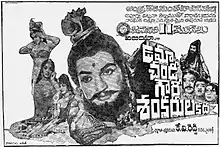Uma Chandi Gowri Sankarula Katha
Uma Chandi Gowri Sankarula Katha (transl. The story of Uma, Chandi, Gowri and Sankara) is a 1968 Indian Telugu-language Hindu mythological film directed by K. V. Reddy. The film was produced by Nagi Reddi and Chakrapani under the Vijaya Productions banner. It stars N. T. Rama Rao and B. Saroja Devi, with music composed by Pendyala Nageswara Rao.[1][2] Released on 11 January 1968, the film was a commercial failure.[3]
| Uma Chandi Gowri Sankarula Katha | |
|---|---|
 Theatrical release poster | |
| Telugu | ఉమా చండీ గౌరీ శంకరుల కథ |
| Directed by | K. V. Reddy |
| Written by | Pingali (dialogues) |
| Screenplay by | K. V. Reddy |
| Story by | K. V. Reddy Pingali Nagendra Rao Singeetam Srinivasa Rao |
| Produced by | Chakrapani Nagi Reddy |
| Starring | N. T. Rama Rao B. Saroja Devi |
| Cinematography | Madhav Bulbule |
| Edited by | G. Kalyana Sunder D. G. Jayaram |
| Music by | Pendyala Nageswara Rao |
Production company | |
Release date |
|
Running time | 166 minutes |
| Country | India |
| Language | Telugu |
Plot
In a debate among Saptarushis where Bhrigu Maharshi argues that the male is responsible for the entire nature and others say nature (female) is the origin of the universe. Bhrigu wanted to clarify his doubt with Siva.
Upon reaching Kailasa, Siva would be teaching lessons on dance to Parvati and since they were in the process, he would be ignored by Parvati and Siva. Losing patience, Bhrigu curses Parvati to take birth three times on Earth and suffer from human-related misfortune. Parvati also curses Bhrigu to take birth as a demon who makes the mankind suffer.
Parvati, upon praying to Siva, receives the favour, that she would take birth only one time, but as triplets and he will take birth to protect her and convert her human-related misfortune into a boon with his company. The crux of the story is all about how Siva meets these three women and how he assassinates the demon (Bhrigu).
In the climax, Siva fights the demon (Bhrigu) and releases him from the curse and at the same time, Parvati also gets released from all her human suffering, turns into a Goddess, and reaches Siva.
Cast
- N. T. Rama Rao as Siva / Sankara
- B. Saroja Devi as Uma, Chandi and Gowri
- Relangi
- Ramana Reddy
- Dhulipala
- Padmanabham
- Allu Ramalingaiah
- Mukkamala
- Dr. Sivaramakrishnaiah
- Rushyendramani
- Chayadevi
- Girija
- Suryakala
- Meena Kumari
Soundtrack
| Uma Chandi Gowri Shankarula Katha | |
|---|---|
| Film score by | |
| Released | 1968 |
| Genre | Soundtrack |
| Length | 28:00 |
| Producer | Pendyala Nageswara Rao |
Music composed by Pendyala Nageswara Rao. Lyrics were written by Pingali.[4]
| S. No. | Song Title | Singers | length |
|---|---|---|---|
| 1 | "Aahasakhi Ee Vaname" | P. Susheela | 3:01 |
| 2 | "Emito Ee Maya" | Ghantasala | 3:59 |
| 3 | "Abbalalo o Abbalalo" | Ghantasala | 2:43 |
| 4 | "Kalagantiva Cheli" | Ghantasala | 2:47 |
| 5 | "Nannu Varinchu Veerudu" | L. R. Eswari | 2:45 |
| 6 | "Nee Leela Loney" | Ghantasala, P. Susheela | 3:19 |
| 7 | "Sri Gowri" | P. Leela | 2:32 |
| 8 | "Siggulolike Sengari" | Ghantasala, L. R. Eswari | 3:34 |
| 9 | "Yelamarachinaavo" | S. Janaki | 3:20 |
References
- Masura. "సినిమా: ఉమా చండి గౌరీ శాంకురాల కథ" [Cinema: Uma Chandi Gowri Shankarula Katha]. Visalaandhra (in Telugu). Archived from the original on 6 October 2022. Retrieved 24 September 2020.
- Krishna, Radha (21 January 1968). "రూప వాని: ఉమా చండి గౌరీ శాంకురాల కథ" [Roopa Vaani: Uma Chandi Gowri Shankarula Katha]. Andhra Prabha (in Telugu). Archived from the original on 14 November 2020. Retrieved 24 September 2020.
- U. Vinayaka Rao 2012, p. 99.
- "Uma Chandi Gowri Shankarula Katha (1968)-Song_Booklet". Indiancine.ma. Archived from the original on 5 April 2013. Retrieved 7 September 2021.
Bibliography
- U. Vinayaka Rao (2012), Telugu Cine Rangam - Pouranika Chitralu, Hyderabad: Telugu Academy, retrieved 6 October 2022